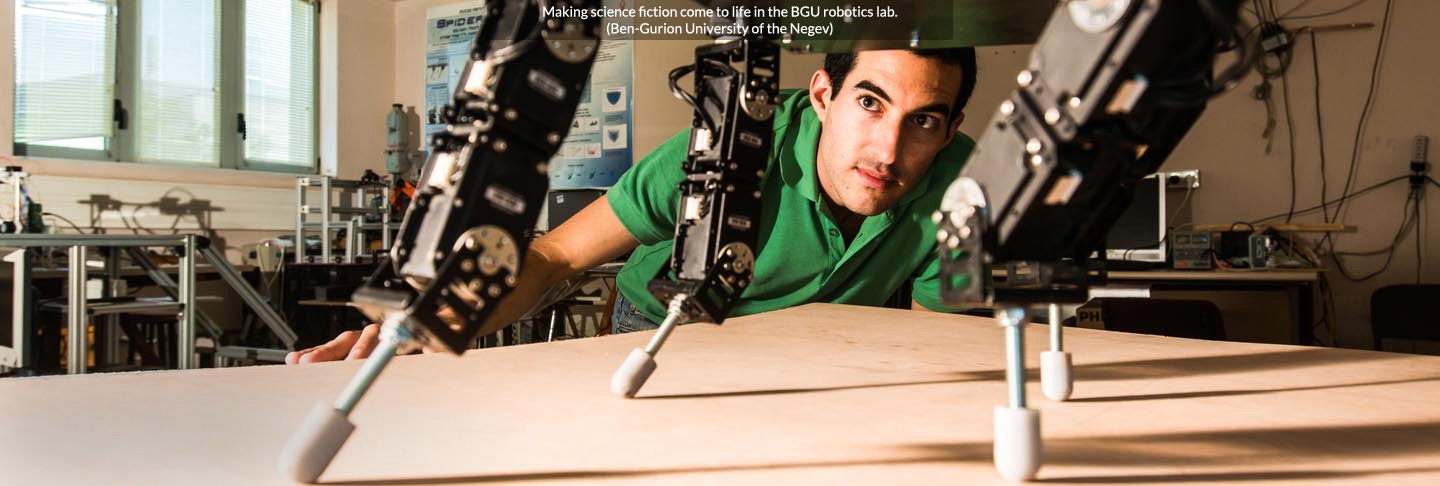It’s as simple as ABC. Robotic technology has made a significant impact in fields from health care to agriculture and service industries, improving speed, quality and cost. Thanks to a major initiative in robotics research coming out of Israel, the technology is only getting better.
Robots will soon be endowed with “intelligent” behavior, inspired by biological models and human behavior. They will be able to continuously adapt anew, be capable of performing under unforeseen conditions, and will have capacities well beyond those of current robotic systems.
Ben-Gurion University of the Negev’s ABC Robotics Initiative promises to generate the advancements you’d expect from one of the world’s most innovative research institutions. The goal is to focus on multidisciplinary, application-oriented research and the development of autonomous robotic systems in areas that solve medical, agricultural and industrial challenges.
“Robots require humanlike cognitive capabilities to successfully enter real-world settings and cope with dynamic and unstructured human environments,” says Prof. Yael Edan, founder and director of the initiative and a member of BGU’s Department of Industrial Engineering and Management. “This requires robots to be equipped with advanced perception and dexterity, as well as the ability to adapt to changing conditions and to efficiently learn new tasks.”
Robots are being equipped with specific physical and behavioral characteristics to make interaction with humans comfortable and natural. Development criteria include innovation, multidisciplinary collaboration between faculty members, and international collaboration that address ABC needs: agricultural, biological and cognitive.
Agricultural Robots – Autonomous (self-thinking/driven as opposed to remote control or human-driven) robots are being developed for targeted spraying and selected harvesting of crops. They must perform these tasks without damaging the fruits and vegetables, while also determining the ripe from the unripe, the fruit from the plant, and the weed from plant. The research focuses on developing “intelligent” platforms for the agro-management of high-value crops and on innovative human-robot collaborative models and systems.
Biological Robots – Studying nature and the world around us, robots that crawl like snakes are being invented that can be miniaturized to perform biopsies or deliver targeted drugs in the human body, or enlarged to perform pipe maintenance or search and rescue operations. Other robot designs imitate spiders, fish, lizards, and cats to perform tasks in environments where legs and wheels won’t do.
Cognitive Robots – Research focuses on endowing robots with higher-level cognitive capabilities that allow for intelligent perception, reasoning, decision making, manipulation, collaborative functioning and learning. This type of robotics research is underpinned by computational neuroscience, psychological and physiological approaches. These robots are helping the elderly or injured walk, helping the paralyzed communicate, assisting surgeons, and driving autonomous vehicles.
“Ben-Gurion University is developing robots to benefit humans and improve the safety and security of Israel and the world,” says Amir Shapiro, head of BGU’s Robotics Lab in the Department of Mechanical Engineering.
The ABC Initiative is supported by the Leona M. and Harry B. Helmsley Charitable Trust.
Together with supporters, AABGU is helping Ben-Gurion University of the Negev foster excellence in teaching, research and outreach to the communities of the Negev, sharing cutting-edge innovation from the desert for the world. Visit aabgu.org to learn more.

